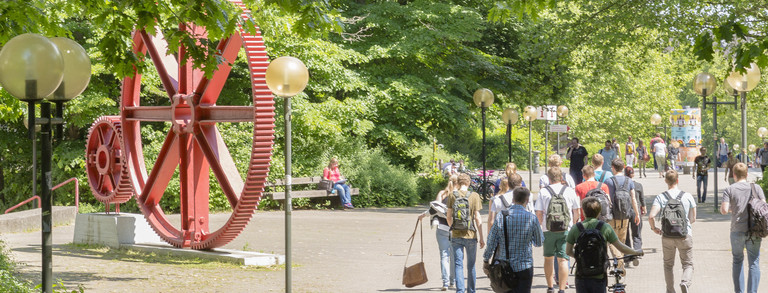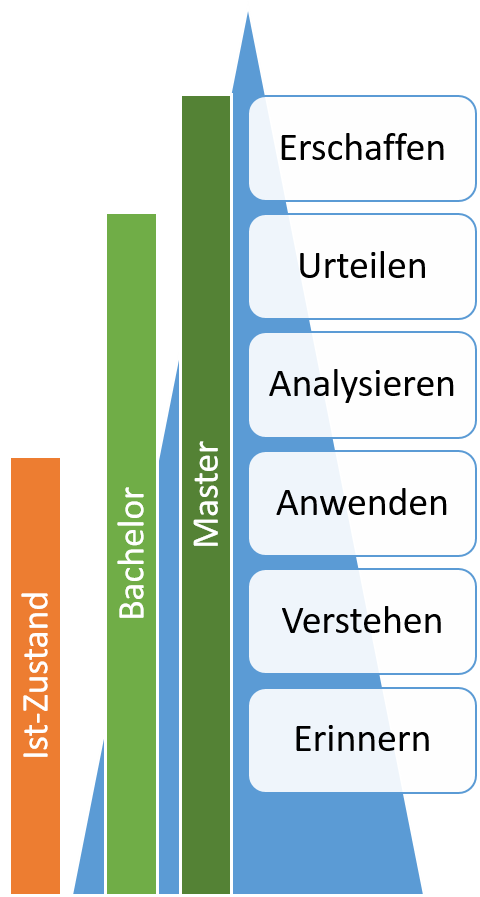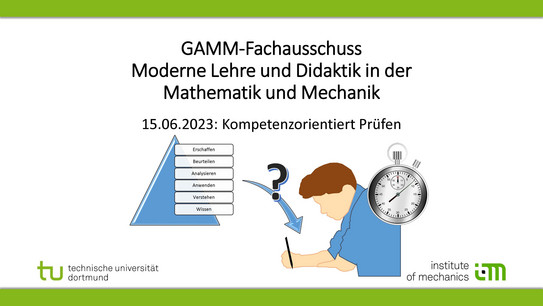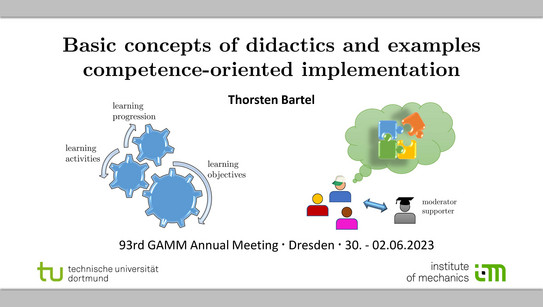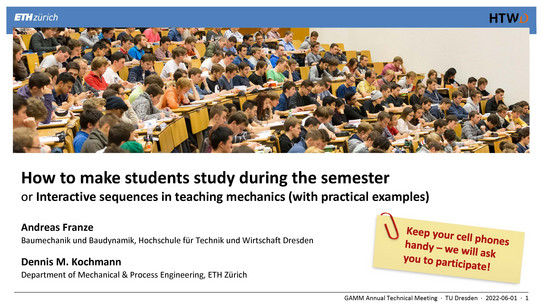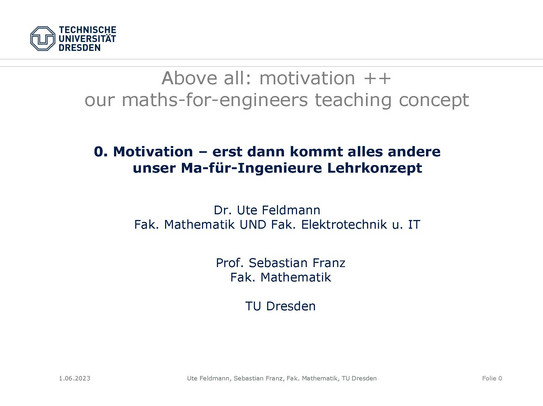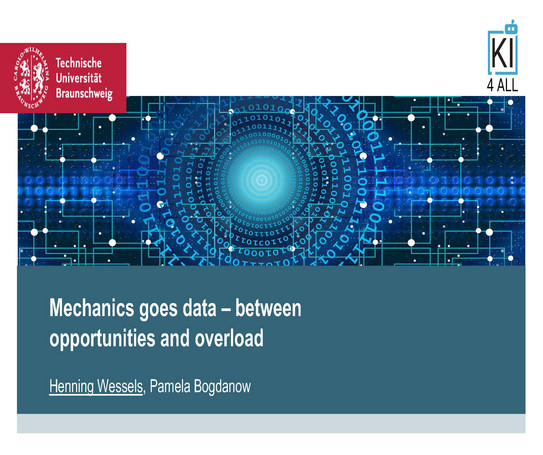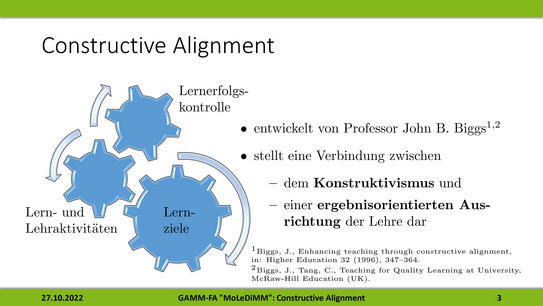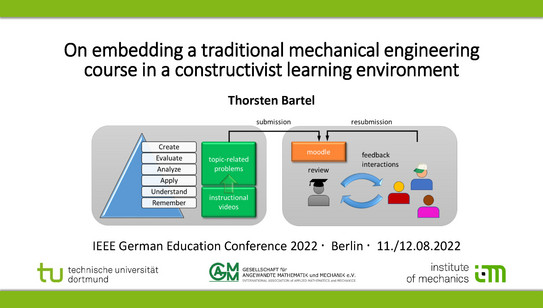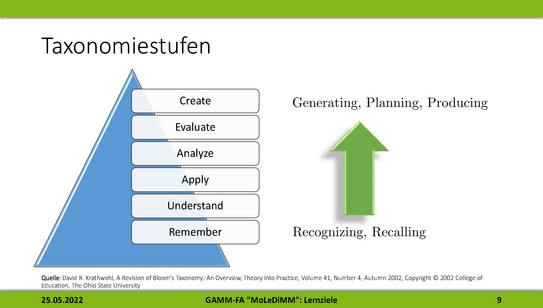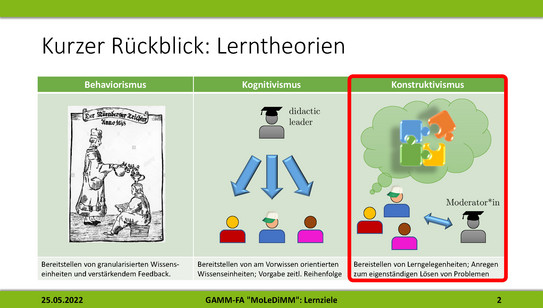Modern teaching and didactics in mathematics and mechanics
The Association of Applied Mathematics and Mechanics - GAMM for short - set up this new technical committee in August 2021. The initiators and coordinators are Dr.-Ing. Thorsten Bartel and Prof. Dr. Tobias Haertel.
Our motivation and goals
In recent years, it has become clear that the increasing heterogeneity of the study cohorts means that the majority of students do not achieve the competencies they urgently need for their future careers. Our technical committee has therefore set itself the goal of redesigning university education in the fields of mathematics and mechanics on the basis of well-founded and modern didactic concepts and the adaptation of teaching to current needs that are strongly oriented towards digitalization. In order to achieve this, we have set ourselves the following milestones:
- Adaptation of the level of knowledge regarding learning theories and modern didactic methods
- Adaptation of teaching to the current state of research in the field of didactics
- Establishment of joint pools of annotated application examples, learning units, competence-oriented examination formats, etc.
- Definition of quality standards for competence-oriented, student-centered teaching, e.g. in the form of a charter
Our activities
To achieve our goals, we agreed at the beginning of our work to hold main meetings on a quarterly basis. These relatively short intervals seem absolutely necessary to us for the targeted exchange of our experiences from previous semesters and for the targeted planning and adaptation of teaching in the coming semesters. In addition, we will also publicize our activities beyond the specialist committee at conferences and similar events. The following activities have already taken place:
Workshop on 10./11.06.2024
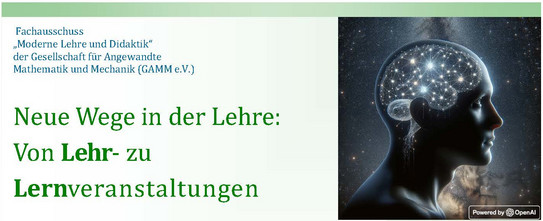
On 10./11.06.2024 we are organizing the workshop
"New ways in teaching: From teaching to learning"
at the TU Dortmund.
This is aimed at all teachers in "Mathematics" and "Mechanics", but also beyond. You can find more detailed information in this flyer.
Sixth meeting 28.11.2023
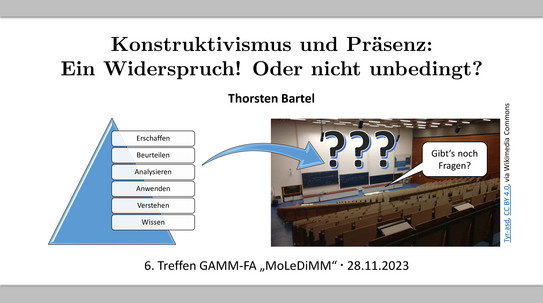
Our sixth meeting focused on two presentations:
- Benjamin Marussig (Institute of Construction Mechanics, TU Graz) presented "mechpy", an impressive tool that has been developed at the Institute of Construction Mechanics over the last few years. With this Python-based and moodle-linked program, individual problems are created for each student, which can also be automatically corrected using STACK.
- Thorsten Bartel (Institute of Mechanics, TU Dortmund University) presented a newly established concept in which face-to-face lectures are combined with methods based on constructivist learning theories. In particular, "Do-It-Yourself" units during the classroom sessions encourage and motivate students to directly apply the theories and methods discussed.
Presentation slides as .pdf
Presentation slides as .pptx
Fifth meeting, 15.06.2023
Our fifth meeting focused on the topic of "competence-oriented testing". The fundamental question here is which of the desired contemporary competencies can be tested at all using conventional summative examination forms. Sufficient time is required to test competencies at the "analyze" and "evaluate" levels. And this time is available with formative forms of assessment.
Summary of the presentation on competence-oriented assessment: Screencast
93rd GAMM Annual Conference, 30.05.-02.06.2023, Dresden
With the participation of our technical committee, the GAMM experienced a novelty in its 100th anniversary: For the first time, a mini-symposium was dedicated solely to the topic of "Didactics and modern teaching". On the one hand, the aim was to explain the basic concepts of didactics to the audience. On the other hand, concrete implementations in the sense of best practice examples were presented. The speakers are listed below together with their abstracts and presentation slides.
- T. Bartel (TU Dortmund): Abstract / Presentation
- D. Kochmann (ETH Zurich), A. Franze (HTW Dresden): Abstract / Presentation
- L. Burr (Ulm University): Abstract
- U. Feldmann, S. Franz (TU Dresden): Abstract / Presentation
- M.H. Gfrerer, B. Marussig, K. Maitz, M.M. Bangerl (TU Graz): Abstract
- H. Wessels (TU Braunschweig): Abstract / Presentation
Fourth meeting, 27.10.2022
Defining explicit learning objectives is an important first step (see contents of the third meeting). Consistently giving students the opportunity to achieve them is another. And the overarching concept of this consistent pursuit of learning objectives is called constructive alignment. This was the central topic of our fourth meeting, in which we discussed this concept very constructively and in detail.
Summary of the presentation on constructive alignment: Screencast
IEEE GeCon, 11/12.08.2022, Berlin
The German section organized this hybrid conference at TU Berlin with the aim of providing a platform for discussion of teaching/learning concepts, see also https://www.gecon2022.org/. Included was also a peer-reviewed publication entitled "On embedding a traditional mechanical engineering course in a constructivist learning environment", which is published on IEEE Xplore. The associated preprint may be made available here.
Presentation slides: PDF version / PPTX version
Third meeting, 25.05.2022
This meeting focused in particular on the need for precise formulation of learning objectives/learning outcomes. Teachers must ask themselves in advance which competencies students should have acquired at which level after completing the course. The definition of taxonomy levels is also very important here. Internal surveys conducted during this meeting revealed that the desired competencies and those achieved so far in the courses do not coincide for the majority of students.
Summary of the presentation on learning objectives/learning outcomes: Screencast T. Bartel
Second meeting, 08.02.2022
Just in time for the end of the lecture period of the winter semester, our second meeting took place in which we discussed various learning theories and which processes in the brain can enable or facilitate learning. The good practice example was provided by Prof. Dennis Kochmann from ETH Zurich and showed how concepts such as "Peer Instruction" and "Flipped Classroom" can be meaningfully and purposefully embedded in lectures.
Summary of the meeting: Screencast T . Bartel Summary of the presentation on learning theories: Screencast T. Haertel
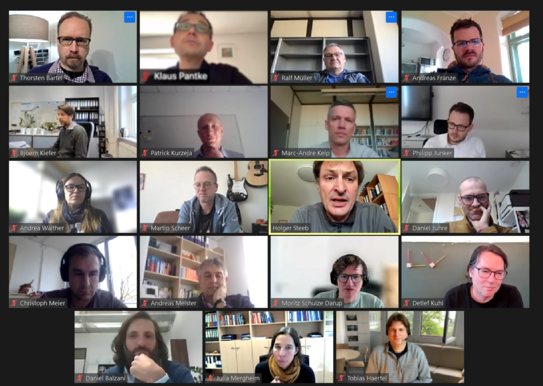
First meeting, 09.11.2021
In our first very constructive meeting, we summarized, among other things, the existing challenges that have piled up in our experience over the last few years - and this in principle regardless of the circumstances of the pandemic since March 2020. We also defined the general objectives of our technical committee. Together, we considered how we want to organize the content of the meetings and the frequency with which they should take place. Towards the end of the meeting, we discussed the next concrete steps. We have summarized the main content of this meeting in a short video.
If you are interested in the content of our technical committee, please feel free to contact us by e-mail. Participation in our regular meetings is possible and welcome at any time - you do not have to be a permanent member of the committee.
Our further planning
The following activities are currently being planned and prepared:
- In 2024, we are planning to hold a workshop lasting several days.
Who we are
The technical committee was founded in August 2021 with the following members
Prof. Dr. Daniel Balzani (Ruhr University Bochum), Dr. Thorsten Bartel (TU Dortmund University), Prof. Dr. Timm Faulwasser (TU Dortmund University), Prof. Dr. Andreas Franze (Dresden University of Applied Sciences), Prof. Dr. Daniel Juhre (OVG University Magdeburg), Prof. Dr. Philipp Junker (Leibniz University Hannover), Prof. Dr. Marc-André Keip (University of Stuttgart), Prof. Dr. Björn Kiefer (TU Freiberg), Prof. Dr. Dorothee Knees (University of Kassel), Prof. Dr. Dennis Kochmann (ETH Zurich), Prof. Dr. Detlef Kuhl (University of Kassel), Dr. Patrick Kurzeja (TU Dortmund), Prof. Dr. Felix Lindner (University of Kassel), Dr.-Ing. Christoph Meier (TU Munich), Prof. Dr. Andreas Meister (University of Kassel), Prof. Dr. Julia Mergheim (TU Erlangen-Nuremberg), Prof. Dr. Ralf Müller (TU Kaiserslautern), Akad. Dir. Dr. Martin Scheer (TU Dortmund University), Prof. Dr. Moritz Schulze-Darup (TU Dortmund University), Prof. Dr. Andrea Walther (Humboldt-Universität zu Berlin)
Contact
E-mail: fa_didaktikgammorg
Phone: +49 231 755 2668


